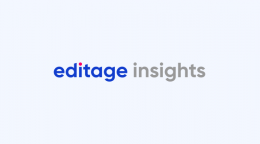“Like any other transition, I had to unlearn and learn a lot of things” - A PhD's journey from research to industry
Careers outside academia
Graduate students, early career researchers, or even established researchers may sometimes be unaware of opportunities other than the traditional path of academic research. This series aims to introduce them to exciting and rewarding careers that can be pursued outside academia. We bring you interviews with experts from diverse backgrounds who share their experiences from their non-academic journeys and tips on how to transition to these paths.

If you are eager to explore the possibilities that await you beyond the confines of academia, look no further! Our captivating series offers you a glimpse into what lies ahead, the experience of transitioning, and the valuable skills you'll acquire.
At Editage, we've long supported researchers who have taken unconventional paths. That's why we're delighted to provide you with perspectives from our colleagues who, having completed their PhDs, made the bold move into scientific editing. They work alongside researchers to ensure success in the publishing world. Brace yourself for an inspiring journey!
Meet Sudeshna Dasgupta! She has a PhD in experimental high-energy physics. Sudeshna worked as a postdoctoral researcher for an experiment at the Large Hadron Collider in CERN, Geneva; this experiment was instrumental in the discovery of Higgs boson, the ‘God Particle’. She now plays the role of Assistant Managing Editor, Physical Sciences at Editage.
Q. Could you tell us a bit about your experience and your current role?
I’m a BE in Electronics and Telecommunication Engineering and a PhD in Experimental High Energy Physics. My PhD research focused on electronic instrumentation for an experiment of the India-based Neutrino Observatory, a mega-science project. The experiment aims to study the phenomenon of ‘neutrino oscillation’, which can provide insights on the origin of the universe. Subsequently, I worked as a postdoctoral researcher for an experiment at the Large Hadron Collider in CERN, Geneva; this experiment was instrumental in the discovery of Higgs boson, the ‘God Particle’.
My interest in science communication motivated me to join CACTUS. I’m a BELS-certified editor and have worked with several researchers to help them meet their publication goals. Currently, I oversee day-to-day functioning of the team and collaborate with other teams to ensure seamless delivery operation. I also mentor new team members and play an integral role in new services and products launched by the company.
Q. What was it like to transition from being a full-time researcher to someone who helps researchers full-time?
As a researcher, I was fully acquainted with my research work, and getting my research published was one of the several responsibilities I had. I had to tweak this perspective after I moved to CACTUS, an organization that offers various services and solutions to help researchers meet their publication goals. I had to adapt to an agile, flexible, and outside-in approach to be able to understand and satisfy the needs of a wide variety of researchers whom we serve while complying with the organizational standards. Hence, the transition from managing my own research to assisting researchers around the world with publishing their work required a paradigm shift of the outlook and focus area.
Q. Was the transition challenging and in what way?
Like any other transition, I had to unlearn and learn a lot of things. This was my first job in the industry, so it required me to get accustomed with industry standards as well. However, a fundamental aspect remained unchanged. While I was a researcher, I enjoyed contributing to different stages of research communication, e.g., drafting a manuscript and making it submission-ready, working on a resubmission, presenting research in engaging content formats for public outreach, etc. I was even entrusted to help a peer group publish a manuscript that was not seeing the light of the day since long, and we eventually published it in a reputed journal. So, although the transition required me to get familiarized with new processes and requirements, the basic nature of work was similar to what I had enjoyed doing during my days as a researcher, and this made the learning curve smoother for me.
Q. Are there any skills or takeaways from your academic background that help you in your current role?
As a researcher, I played a key role in publishing several important research papers, and thereby developed a keen interest in science communication. My research experience offers me the unique proficiency to comprehend a research paper and interpret customer requirements from the perspectives of a researcher as well as an editor. Moreover, I was trained to follow a logical approach and address a research problem by breaking it up into subproblems and identifying the root cause(s).
In addition, I worked on mega-scale experiments that involved collaboration among few hundreds or thousands of researchers. Such experiences and skills have been immensely useful in decision-making and problem-solving in my current role, which largely involves overseeing day-to-day operations, collaborating with other teams, and coaching new team members.
Comments
You're looking to give wings to your academic career and publication journey. We like that!
Why don't we give you complete access! Create a free account and get unlimited access to all resources & a vibrant researcher community.

Subscribe to Career Growth




































